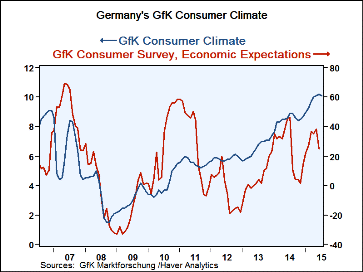 Global| Jun 25 2015
Global| Jun 25 2015German Confidence Heads for Small Set-Back
Summary
The GfK month-ahead projection of German consumer confidence sees a small set back in store. The drop is to 10.1 in July from 10.2 in June. At a level of 10.1, the German confidence index is higher just 1.2% of the time historically. [...]
 The GfK month-ahead projection of German consumer confidence sees a small set back in store. The drop is to 10.1 in July from 10.2 in June. At a level of 10.1, the German confidence index is higher just 1.2% of the time historically. The story here is that confidence is staying so very high. Not that there is this very minor set-back. The set-back is being blamed on concerns over what happens in Greece.
The GfK month-ahead projection of German consumer confidence sees a small set back in store. The drop is to 10.1 in July from 10.2 in June. At a level of 10.1, the German confidence index is higher just 1.2% of the time historically. The story here is that confidence is staying so very high. Not that there is this very minor set-back. The set-back is being blamed on concerns over what happens in Greece.
The component details from GfK lag by one month. In June the economic barometer fell back to 24.9 from 38.3, leaving it in its 76th historic percentile, a very moderate position. Income expectations rose smartly to 57.2 in June from 52.0 the month before, boosting it to an all-time high reading (back to January 2002). The GfK propensity-to-buy index in June fell to 57.0 from 62.6 in May, leaving it with a still-strong 93.2 percentile standing. German consumers seem to have some concerns about the economy, but the more personal responses about their income and propensity to buy elicits stronger responses.
Compare the German response to those in several other EU/EMU members. Italy's standing is quite high in its 92nd percentile despite having ongoing problems with economic performance. France, on the other hand, has economic issues and that shows in its consumer confidence reading that has only a 54th percentile standing. The U.K., a country not in the single currency area, has an 89th percentile standing for its consumer confidence reading.
What these data continue to show is the terrific environment that continues to exist in Germany. While Germans have concerns about economic performance and Germany's PMI gauges are still lagging, the quality of living there is head-and-shoulders above most of the rest of Europe. Italy manages to post strong confidence numbers despite poor economic performance, while France is still struggling on all fronts. Greece is getting ever closer to a final resolution. Earlier in the week, there appeared to be a deal in the making, but it is not surprising that the devil appeared in the details. The IMF and Germany are sticklers for details and they want pledges of real import instead of vague promises over how tax revenues will go up. Greece may not be the promised-land, but it still thinks it can get by being the land of promises. That view is being sorely tested.

Robert Brusca
AuthorMore in Author Profile »Robert A. Brusca is Chief Economist of Fact and Opinion Economics, a consulting firm he founded in Manhattan. He has been an economist on Wall Street for over 25 years. He has visited central banking and large institutional clients in over 30 countries in his career as an economist. Mr. Brusca was a Divisional Research Chief at the Federal Reserve Bank of NY (Chief of the International Financial markets Division), a Fed Watcher at Irving Trust and Chief Economist at Nikko Securities International. He is widely quoted and appears in various media. Mr. Brusca holds an MA and Ph.D. in economics from Michigan State University and a BA in Economics from the University of Michigan. His research pursues his strong interests in non aligned policy economics as well as international economics. FAO Economics’ research targets investors to assist them in making better investment decisions in stocks, bonds and in a variety of international assets. The company does not manage money and has no conflicts in giving economic advice.
More Economy in Brief
 Global| Feb 05 2026
Global| Feb 05 2026Charts of the Week: Balanced Policy, Resilient Data and AI Narratives
by:Andrew Cates






